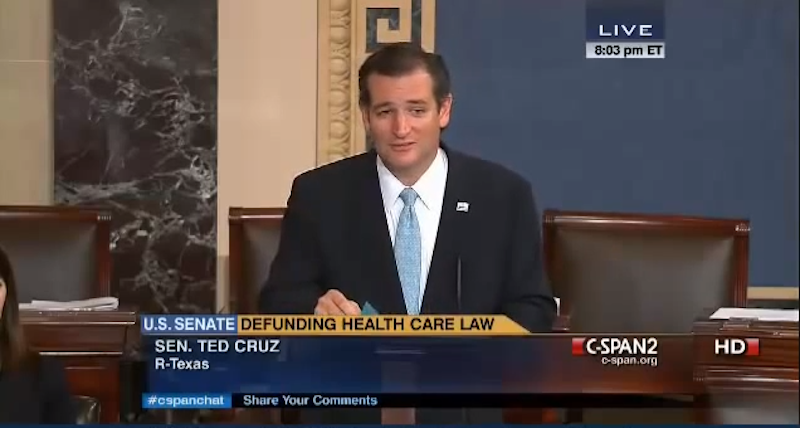Cruz does not like Obamacare
He doesn’t like to care or share
He doesn’t want to help the poor
He wants the rich to just have more
He likes to bully folks around
His own voice is his favorite sound
If Dr. Seuss had met Ted Cruz
He’d tell him, “Ted, I hope you lose.”
Senator Ted Cruz has egg on his face. Green egg.
On Tuesday, during his 21-hour marathon filibuster against Obamacare, he read aloud to his daughters back home the Dr. Seuss book “Green Eggs and Ham.” But he clearly missed its message.
In the Seuss tale, Sam-I-Am, a lover of green eggs and ham, tries to convince a friend to try them. But the man resists. He resists so persistently and so adamantly that he ends up sounding a lot like the Republicans on Capitol Hill who are determined to defund Obama’s health care reforms. But in the Seuss story, the man is finally convinced to try the offending eggs and ham and, much to his surprise, he loves them.
If only the GOP would take a page from that book.
In fact, the GOP could do a lot worse in its choices for filibuster reading material than Dr. Seuss books. Theodor Geisel – who adopted the pen name Dr. Seuss — was an outspoken progressive who actually has a lot to teach Cruz and other Republicans today. If he were alive today, Geisel (1904-1991) would no doubt be poking fun at the power-hungry ultra-conservative Senator from Texas and his Republican colleagues.
In 1940 and 1942, before he became the world’s best-selling children’s author, Geisel was an editorial cartoonist for PM, a fervently liberal pro-New Deal daily newspaper in New York that devoted sections to unions, women’s issues and civil rights. The tabloid paper “was against people who pushed other people around,” Geisel explained. “I liked that.”
His cartoons viciously but humorously attacked Adolf Hitler and Benito Mussolini. He bluntly criticized isolationists who opposed American entry into World War II, especially the famed aviator (and Hitler booster) Charles Lindbergh and right-wing radio priest Father Charles Coughlin, both of whom were anti-Semites. He used his cartoons to challenge racism against Jews and blacks, union-busting and corporate greed, which he thought divided the country and hurt the war effort. He decried the U.S. military’s racial segregation policies. In 1947, Geisel lampooned Cold War anti-communist hysteria with a drawing in the New Republic that showed Uncle Sam looking on in horror at Americans accusing each other of being Communists.
In his children’s books, Geisel was often a moralist, and his politically progressive views suffuse his stories. His books use ridicule, satire, wordplay and wild drawings to take aim at bullies, hypocrites and demagogues. Many Dr. Seuss books are about the misuse of authority–by despots, kings or even parents. In a university lecture in 1947–a decade before the modern civil rights movement–Geisel urged would-be writers to avoid the racist stereotypes common in children’s books, noting that while America “preaches equality but doesn’t always practice it.”
So go for it, GOP. Embrace Dr. Seuss as the go-to author for future GOP filibusters. Here are some ideas to get you started:
Horton Hears a Who! (1954)
This book, written during the McCarthy era, features Horton the Elephant, who befriends tiny creatures (the “Whos”) whom he cannot see but can hear thanks to his large ears. In the book, Horton rallies his neighbors to protect the endangered Who community. As Horton puts it: “a person’s a person, no matter how small.” The story is clearly a parable about protecting the rights of minorities, urging “big” people to resist bigotry and indifference toward “small” people, and the importance of speaking out against injustice.
Yertle the Turtle (1958)
In this book, Yertle, king of the pond, stacks up his subjects and stands on top of them in his attempt to reach higher than the moon. Mack, the turtle at the very bottom of the pile, finally protests:
“I don’t like to complain,
But down here below, we are feeling great pain.
I know, up on top you are seeing great sights,
But down at the bottom we, too, should have rights.”
Yertle tells Mack to shut up. Frustrated and angry, Mack burps, shaking the carefully piled turtles, and Yertle falls into the mud. His rule ends and the turtles celebrate their freedom. Geisel’s message? Ordinary people can overthrow unjust rulers if they understand how to use their own power.
The Sneetches (1961)
In this book, a condemnation of bigotry, some of the yellow, birdlike creatures known as Sneeches have green stars on their bellies. They look down on the Sneetches without them. After the starless Sneetches pay a huckster to get stars put on their bellies, the ones with stars pay the same huckster to take theirs off. Eventually, after several rounds of star addition and removal, the Sneetches realize the absurdity of judging someone by something so absurd as a belly star.
The story is an obvious allegory about racism and discrimination, clearly inspired by the yellow stars that the Nazis required Jews to wear on their clothing to identify them as Jewish. We can see the contemporary relevance of Seuss’ story to the plight of undocumented immigrants and the movement for immigrant rights – a struggle that Cruz and most Republicans oppose.
The Lorax (1971)
This cautionary tale about pollution came out less than a year after the environmental movement held its first Earth Day celebration. Geisel called it “straight propaganda”–a polemic against pollution–but it also contains some of Geisel’s most creative made-up words, like “cruffulous croak” and “smogulous smoke.” In it, a man tells a young boy the story of how the area lost its lovely Truffula trees and Bar-ba-loots despite the best efforts of the Lorax, who “speaks for the trees.” His warnings are ignored by Once-ler, the factory owner, who insists:
“Business is business!
And business must grow.”
Eventually, however, the Once-ler shows some remorse, telling the boy:
“Unless someone like you
cares a whole awful lot
nothing is going to get better
It’s not.”
Recently turned into a popular film, The Lorax attacks corporate greed and excessive consumerism. The book was once banned by a California school district because of its obvious opposition to clear-cutting by the powerful logging industry. Unlike the Once-ler, Cruz has revealed no second thoughts about his anti-environmental views. According to the League of Conservation Voters, in his short stint in the Senate so far, Cruz has voted the wrong way on all seven key environmental measures.
The Butter Battle Book (1984)
Geisel wrote this story, another strong statement about a pending catastrophe–the nuclear arms race between the United States and the Soviet Union — while Ronald Reagan was president. “I’m not anti-military,” Geisel told a friend at the time, “I’m just anti-crazy.” The story is a parable about the dangers of “mutually assured destruction” brought on by the escalation of nuclear weapons. Geisel’s satirical gifts are on display. The cause of the senseless war is a trivial conflict over toast. The battle is between the Yooks and the Zooks, who do not realize that they are more alike than different, because they live on opposite sides of a long wall. They compete to make bigger and better weapons until both sides invent a destructive bomb (the “Bitsy Big-Boy Boomeroo”) that, if used, will kill both sides. Like The Lorax, there is no happy ending or resolution. As the story ends, the generals on both sides of the wall are poised to drop their bombs.
It would be hard even for Senator Cruz to miss Geisel’s point.
Peter Dreier teaches politics and chairs the Urban & Environmental Policy Department at Occidental College. His latest book is The 100 Greatest Americans of the 20th Century: A Social Justice Hall of Fame (Nation Books, 2012). Theodor Geisel (Dr. Seuss) is one of the people he profiles in the book. An earlier version of this column appeared in the Los Angeles Times.









